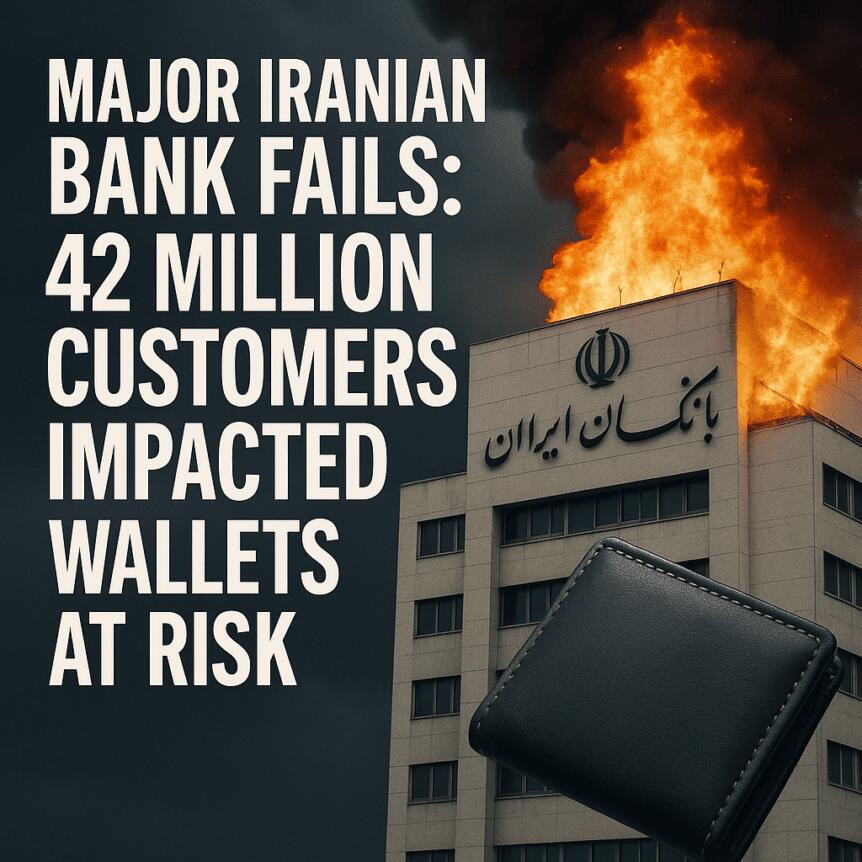Major Iranian Bank Fails: 42 Million Customers Impacted Wallets at Risk

Iran’s banking sector faces yet another crisis, with one of its largest private banks declaring bankruptcy amid mounting financial turmoil. This development underscores the fragility of the country’s financial system and raises concerns about the stability of its banking infrastructure and the broader implications for cryptocurrency and blockchain markets in Iran.
- Ayandeh Bank, Iran’s third-largest private institution, goes bankrupt after incurring $5.1 billion in losses and nearly $3 billion in debt.
- The bank’s collapse triggers the absorption of assets for over 42 million customers, with the state-owned Bank Melli stepping in to manage the fallout.
- Iran’s banking system remains vulnerable due to widespread sanctions and economic sanctions, which restrict access to international financial networks.
- The incident highlights the risks associated with traditional banking institutions, emphasizing the potential role of crypto assets in stabilizing financial portfolios under sanctions.
- In the global context, recent US banking crises have driven Bitcoin prices above $29,000, reflecting growing distrust in conventional banks.
In a significant blow to Iran’s financial sector, Ayandeh Bank, one of the country’s prominent private banks, officially declared bankruptcy on Thursday. The bank, which managed over 270 branches nationwide, accumulated losses totaling approximately $5.1 billion and nearly $3 billion in debts. The collapse came shortly after the Central Bank of Iran (CBI) failed to intervene with a bailout, forcing authorities to close its operations and safeguard its depositors.
The fallout affected more than 42 million banking customers, whose assets are now being absorbed by Bank Melli, a state-owned lender. While the CBI’s governor, Mohammad Reza Farzin, assured depositors that they would be able to recover their savings immediately, the incident underscores broader risks associated with banks operating under fractional reserve practices and seeking bailouts when facing insolvency.
Historically, failures like this seem to align with the motivations behind Bitcoin’s creation, as Satoshi Nakamoto embedded a reference in the genesis block suggesting that bank bailouts and monetary instability are systemic issues prompting the need for decentralized alternatives.
Globally, recent US banking crises have strengthened crypto markets, with Bitcoin surging from below $20,000 to over $29,000 amidst growing skepticism towards traditional banks following the failures of Silicon Valley Bank, Signature Bank, and Silvergate Bank earlier this year. A report from Morningstar highlighted that, despite some reserves and deposits being bolstered since March, US regional banks remained under stress.
Eight Iranian banks at risk of dissolution
The Iranian banking system faces additional pressure from international sanctions that limit access to the US dollar and restrict global financial transactions. The ongoing sanctions exacerbate the economic challenges faced by Iran, including the persistent decline in the value of the Iranian rial. Earlier this year, regulators warned that eight local banks could face dissolution unless significant reforms are carried out.
Crypto adoption within Iran has been hampered by regulatory issues, with major exchanges like Nobitex being targeted in an $81 million hack in June. The incident contributed to an 11% decline in Iranian crypto flows amid ongoing regional conflicts, especially with Israel.
Overall, Iran’s financial instability and the rise of cryptocurrencies illustrate the complex interplay between geopolitical sanctions, economic uncertainty, and the evolving landscape of blockchain technology in the region.
This article was originally published as Major Iranian Bank Fails: 42 Million Customers Impacted Wallets at Risk on Crypto Breaking News – your trusted source for crypto news, Bitcoin news, and blockchain updates.
You May Also Like

A trader with an 80% win rate faced a $3.3 million loss on his BTC short position and added another 1 million USDC to avoid liquidation.

Pan Gongsheng: The People's Bank of China will work with law enforcement agencies to continue cracking down on the operation and speculation of virtual currencies in China and maintain economic and fi
